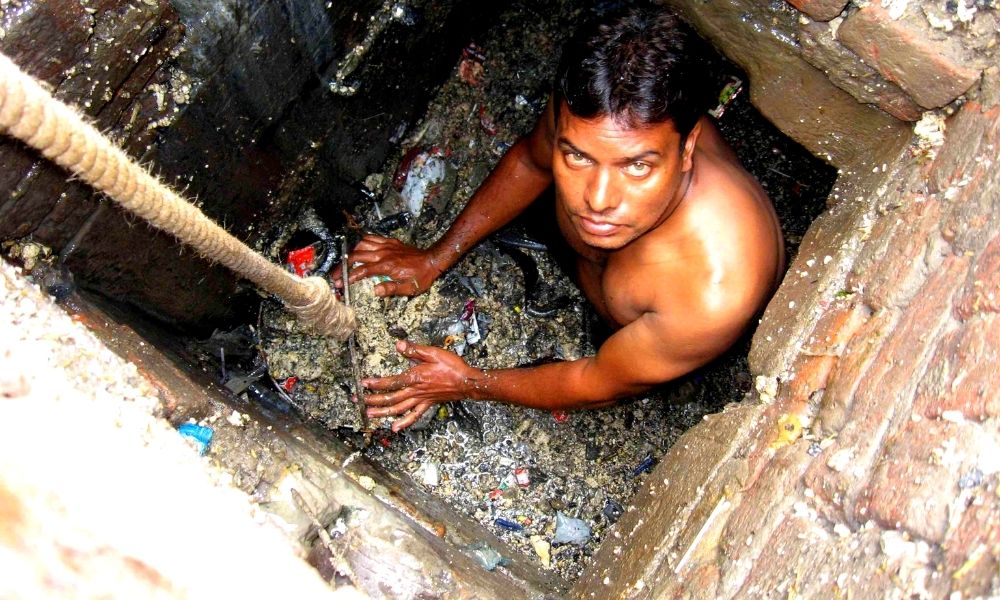LI Network
Published on: October 22, 2023 at 11:40 IST
The Supreme Court of India has issued a comprehensive set of 14 directions to both the Union and State Governments aimed at eradicating the deplorable practice of manual scavenging.
These directives emphasize the strict implementation of the Prohibition of Employment as Manual Scavengers and their Rehabilitation Act, 2013. The Court is resolute in its determination to put an end to the inhumane and hazardous practice of manual cleaning of sewers.
The bench, consisting of Justices S Ravindra Bhat and Aravind Kumar, delivered these directives within the case of Dr. Balram Singh v. Union of India and others.
The Court has taken a strong stance to ensure that no individual is compelled to enter sewers manually for any purpose and to eliminate the practice of manual sewer cleaning.
The key directions issued by the Supreme Court are as follows:
- The Union Government must implement measures and policies, issuing directions to all statutory bodies, corporations, railways, and agencies under its control to phase out manual sewer cleaning. They should also ensure that any sewer cleaning work outsourced to contractors does not involve individuals entering sewers.
- All States and Union Territories are directed to incorporate the Union’s guidelines into their own policies, applicable to all municipalities and local bodies within their jurisdictions.
- The Union, States, and Union Territories must provide full rehabilitation, including employment opportunities, education for dependents, and skill training for sewage workers and the families of deceased workers.
- The compensation for sewer deaths should be increased to Rs. 30 lakhs, and this amount should be paid by the relevant agency, i.e., the Union, Union Territory, or the State. It applies to all future cases and unpaid compensation to dependents.
- Sewer victims with disabilities should receive compensation based on the severity of their disabilities, with a minimum compensation of Rs. 10 lakhs, increasing to Rs. 20 lakhs for permanent disabilities rendering the victim economically helpless.
- Mechanisms for accountability, including contract cancellation and financial penalties, should be established for cases where sewer deaths occur during contracted or outsourced work.
- The Union should create a model contract, to be adopted by States and Union Territories, emphasizing adherence to standards in line with the 2013 Act, with consequences for mishaps.
- A National Survey, to be completed within one year, should be organized within three months by NCSK, NCSC, NCST, and the Secretary, Union Ministry of Social Justice and Empowerment.
- Models should be developed to educate and train committees involved in the survey.
- Scholarships should be established to provide meaningful education to dependents of sewer victims.
- The National Legal Services Authority (NALSA) should participate in framing policies and models for compensation disbursement and be involved in the survey’s planning and implementation.
- Committees and commissions at the state and district levels should be established for effective coordination and monitoring.
- Training and education modules should be created to educate agencies under the 2013 Act.
- A portal and dashboard, containing information on sewer deaths, compensation status, and rehabilitation measures, should be developed.
The Supreme Court’s directives highlight the commitment to ending manual scavenging and ensuring the dignity and rights of those involved in this perilous practice. The ruling underscores the importance of dignity and fraternity and the obligation of the Union and States to implement the law in both letter and spirit.
In the words of Justice Bhat, “Our Constitution has placed great emphasis on the value of dignity and fraternity. All of us today who proudly bask in the achievements of our republic have to awake and arise so that the darkness which has been the fate of generations of our people is dispelled, and they enjoy these freedoms and justice.”
The Court expressed its gratitude to amicus curiae K Parameshwar for his invaluable assistance, and several legal representatives were involved in the case.
Case Title: Dr. Balram Singh vs. Union of India, Writ Petition (Civil) No. 324/2020

